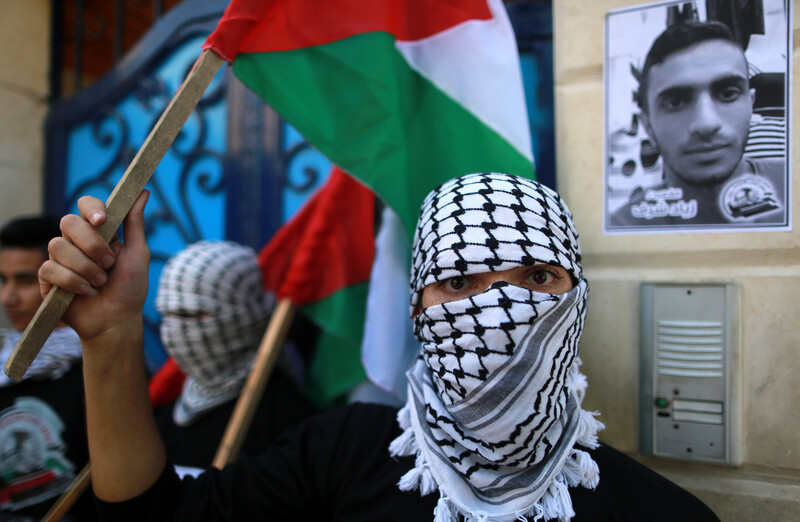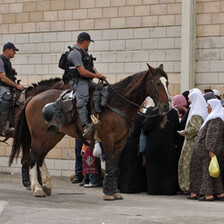The Electronic Intifada 9 November 2015

Palestinians in Gaza protest in support of the uprising in the West Bank, 2 November.
APA imagesWhat is happening in Palestine? Is it a new intifada? If so, what are its slogans?
Many compare the current situation in Palestine with apartheid South Africa. The tribal chiefs of the South African bantustans — the nominally independent Black-ruled “homelands” created by the racist government — used to believe that they were heads of sovereign states. The apartheid regime promoted the fiction of Black independence under its overall control in an attempt to legitimize and perpetuate white rule.
While the anti-apartheid movement and most of the world rejected the idea of separation based on racial identity in South Africa, the Palestinian leadership boasts of having laid the foundation for its own bantustan, claiming it to be the “State of Palestine.”
For Zionism to survive in Palestine, the “other” — the indigenous Palestinian people — must be assimilated and subjugated without being conscious of that subjugation. This was the thinking behind Israel’s decision to grant Palestinians “autonomy” under the Palestinian Authority. It is the logic behind the 1993 Oslo accords between Israel and the Palestine Liberation Organization that created that authority.
Oslo aimed to bring about the Palestinians’ surrender and create among them a passive consciousness, but its architects did not foresee that Israel created its antithesis — defiance and reaction — as a result of decades of ethnic cleansing, settler-colonialism and apartheid.
They did not account for the legacy of civil and political resistance that has become a trademark of the Palestinian struggle. The formation of the Boycott National Committee in 2007, two years after the boycott, divestment and sanctions (BDS) call made by more than 170 Palestinian civil society organizations and around which there is an overwhelming consensus, the resistance to Israel’s war machine in 2009, 2012 and 2014 in Gaza, and the current uprising, all represent what I call a process of de-Osloization.
Statehood illusion
Oslo held out the promise — illusory though it always was — that one-third of the Palestinian people, those living in the Gaza Strip and the West Bank, would realize their “national dream” of statehood on no more than 22 percent of historic Palestine.
But the impossibility of realizing even that — as Israel has entrenched its occupation and relentlessly expanded its colonization in the West Bank, and placed Gaza under permanent siege — ended up, ironically, reviving the embarrassing question of the rights of the remaining two-thirds: the millions of dispossessed refugees inside and outside historic Palestine and the 1.5 million third-class Palestinian citizens of Israel.
The Oslo accords paid lip service to the millions of Palestinian refugees scattered all over the world as a result of the Nakba, the 1948 ethnic cleansing of Palestine by Zionist militias.
But the Palestinian elites who signed Oslo more or less explicitly reassured Israel that they were ready to sacrifice the rights of those refugees in return for a state. The Palestinians in Israel were not mentioned at all.
Oslo was designed — at best — to improve the conditions of oppression (while making some Palestinians partners in the occupation) and thus make Israel’s Palestinian “problem” disappear. In the end, it did not even do that — save for a small Palestinian elite that profited from economic deals with Israel.
Oslo generation
Most events that have taken place in Gaza since the 2006 Palestinian Legislative Council elections — won by Hamas, which had opposed the 1993 accords — have represented a complete rejection of Oslo and its consequences.
And noting that some 80 percent of Palestinians in Gaza are refugees from other parts of Palestine, the results of the 2006 elections in the Gaza Strip and the West Bank become more comprehensible as anti-colonial and anti-Oslo acts.
But this is deliberately hidden by the Oslo signatories and their complicit sponsors.
Palestinians’ resistance depends, like that of Black South Africans under the inhumane apartheid regime, and African-Americans under Jim Crow laws, on the higher moral ground that they occupy as a result of being dispossessed of their rights and land.
Palestinian victory will be the inevitable result of their sumoud — steadfastness on their land — that has not wavered, despite the feeling that they are left to fight Israel on their own.
What has helped keep the Oslo regime alive for so long is the ever fainter promise that redemption — in the form of “statehood” and “self-determination” — lay at the end of it. But the Oslo generation, Palestinians born after or around the time the accords were signed, do not buy it. They are fed up and their message is clear: the problem is not only with the occupation, but also with settler colonialism, apartheid, ethnic cleansing and Israel’s genocidal policies.
The current uprising — whether one calls it an intifada or not — may be the crucible where a new leadership is forged, one that can understand the unity of the cause of all Palestinians, whether inside or outside historic Palestine, whether refugees from today or from long, painful decades ago.
This is a generation that is telling us that they are opposed to all forms of collaboration with the occupier. This is a generation that has seen nothing from Oslo but defeat and humiliation, and they are throwing it off.
They are saying — and we should hear them — that coexistence based on colonization and apartheid is no coexistence at all. It is slavery and they will no longer accept it.
Palestine’s youth are saying: we want all our rights and will accept nothing less.
Haidar Eid is an independent political commentator from the Gaza Strip, Palestine.






Comments
Palestine de-Osloized
Permalink Aida Qasim replied on
In Haidar Eid's requiem for the two states, he writes that the Oslo generation has delivered a clear message: "They are fed up and their message is clear: the problem is not only with the occupation, but also with settler colonialism, apartheid, ethnic cleansing and Israel’s genocidal policies." What these young people have described is the manifestation of zionism.
The UN got it right in 1975 by equating Zionism with racism. It is still fundamentally about zionism - a racist political ideology whose purpose is to ethnically cleanse the indigenous Palestinian people and to colonize the whole of Palestine in order to build an exclusive Jewish homeland. It is an ongoing self perpetuating project that is the basis of our dehumanization as Palestinians everywhere. It is high time for this archaic ideology to be relegated to the history books.
Only one democratic state can provide an alternative vision for future generations. "They are saying [Oslo generation]— and we should hear them — that coexistence based on colonization and apartheid is no coexistence at all. It is slavery and they will no longer accept it." Haidar Eid. Alas, the road to the future is being paved with the blood of the Oslo generation.
Palestinian state
Permalink Mark replied on
As many suspected the Palestinians do not want a state of their own after all.
Not surprising they haven't got one after all these years.